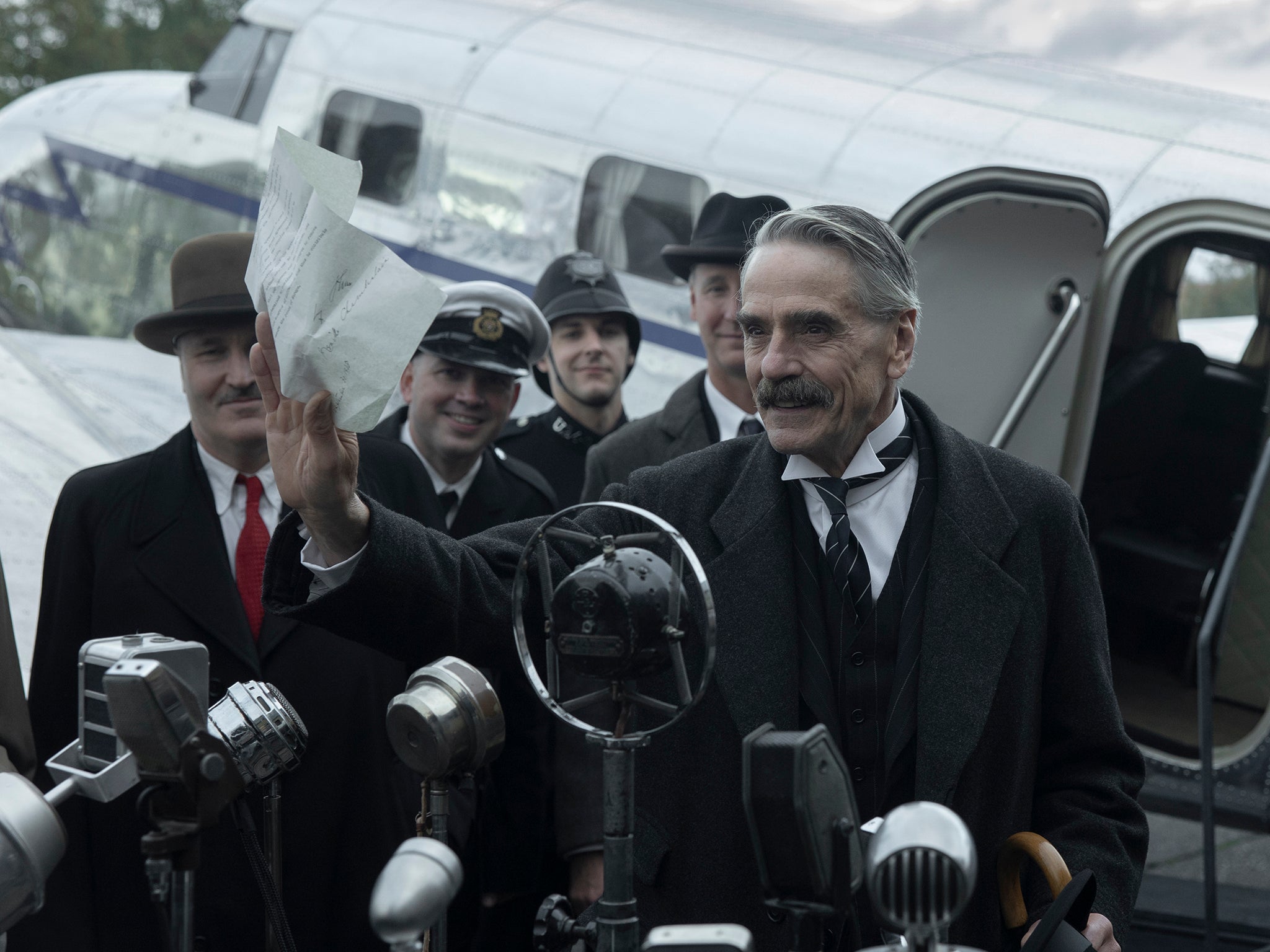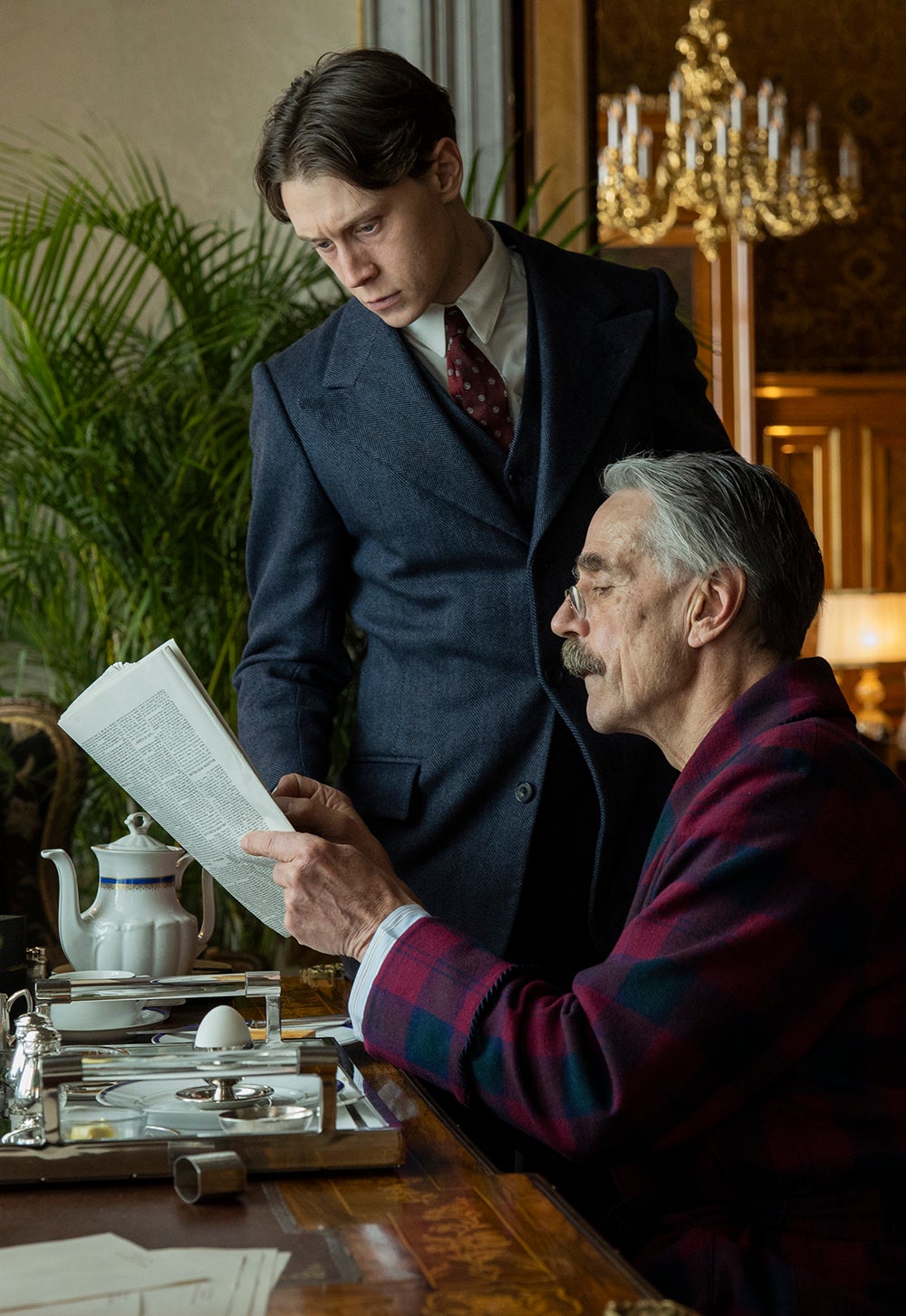Munich: The Edge of War is posh-washing for an elite that’s still in charge today
With the country apoplectic at the entitled behaviour in Downing Street, does the world need the reputation of another Tory flop, Neville Chamberlain, redeemed? As Robert Harris’s historical thriller hits Netflix this week, Oliver Keens argues it’s the wrong film at the wrong time


Your support helps us to tell the story
From reproductive rights to climate change to Big Tech, The Independent is on the ground when the story is developing. Whether it's investigating the financials of Elon Musk's pro-Trump PAC or producing our latest documentary, 'The A Word', which shines a light on the American women fighting for reproductive rights, we know how important it is to parse out the facts from the messaging.
At such a critical moment in US history, we need reporters on the ground. Your donation allows us to keep sending journalists to speak to both sides of the story.
The Independent is trusted by Americans across the entire political spectrum. And unlike many other quality news outlets, we choose not to lock Americans out of our reporting and analysis with paywalls. We believe quality journalism should be available to everyone, paid for by those who can afford it.
Your support makes all the difference.A naughty party on a lawn. Drunk posh people swanning about while oozing entitlement. Everyone acting like the normal rules don’t apply to them. Men urinating openly. Though the booze has run out, someone’s got a cheeky plan to obtain some more… No, this isn’t Downing Street during the pandemic, this is the opening scene of Munich: The Edge of War – an intriguingly pointless film adapted from the book of the same name by historical fiction colossus Robert Harris.
It would be churlish to damn a film for the unfortunate timing of its release, but as it drops on Netflix this week, it’s hard to take Munich seriously amid the howls of national indignation at the recent antics in No 10. For while the film is an attempt to repair the reputation of pre-war PM Neville Chamberlain (witness David Davis quoting what was said to a disgraced Chamberlain in 1940: “In the name of God, go”), it’s mainly a film about powerful yet inept people from privileged elites making a mess of things. I mean, tell me: what’s not to hate right now?
Harris’s promotion for the film has centred around this slightly renegade desire to redeem Chamberlain (prime minister 1937-1940), who at the Munich Conference of 1938 took Hitler at his word that he didn’t want to enter into war – only for Hitler to confound his policy of appeasement by being a bastard and not a gentleman. Every world leader ever since, including in recent years Cameron and Obama, is at some point said to be acting like Chamberlain. It’s become an accepted synonym for being weak, overly trusting or unable to grasp a situation. But where the world has been happy to designate Chamberlain as a totemic figure of embarrassing Tory failure, Harris regards Chamberlain’s failure as “noble… not squalid”.
In the film, helmed by German director Christian Schwochow, Chamberlain is played by Harris’s friend Jeremy Irons – two men who, I think it’s relevant to mention, have been dogged in the past for their support of another individual condemned by history, sex offender Roman Polanski. Unlike the #MeToo movement and its denunciations of the director (who continues to make films and remains a fugitive from the US criminal justice system), it’s fair to say there’s zero public clamour to rehabilitate Neville Chamberlain’s reputation. Have you noticed any grassroots campaigns to, say, erect a statue of him lately? Didn’t think so.
So to inject this spot of revisionist history with some glamour, the film’s action centres around two high-flying young men – one English, one German. We meet both at that aforementioned boozy affair, getting lit during their final days at Oxford University in 1932. Six years later and the Englishman, Hugh Legat (played by George MacKay), is a civil servant while his pal, Paul von Hartmann (Jannis Niewöhner), is a German diplomat increasingly terrified of the Fuhrer’s bellicose rhetoric and antisemitism. As Hitler threatens an invasion of Czechoslovakia, the two college friends are thrust into espionage as a plan emerges to thwart the dictator.
As a side note, though it’s set amid real events, involving real politicians at the real Munich Conference, it’s important to state that the two men are fictional. Worryingly, the film never explains that this is all a fantasy – an alarming omission, given how a browsable and casual platform like Netflix could easily swoop up viewers who don’t know Robert Harris and his trade in historical fiction. It’s honestly not naive to think that some viewers might assume the film is a true historical document. Anyone who stumbles upon, say, Quentin Tarantino’s Second World War film Inglourious Basterds would twig that it’s a fantasy. A crew of tough, working-class Jewish soldiers obviously never gunned down a theatre full of Nazis and shot Hitler to fleshy smithereens. But what’s sad about the world we live in is that it’s tragically believable that a pair of well-educated and ambitious toffs collectively screw up, let their country down and generally bottle it at the last minute.
More worrying is how interminably Oxbridge the film is. Seemingly nobody involved could think of a more relatable reference point to anchor the characters to. From the opening piss-up, a jolly jamboree of black ties, ballgowns and buggering about – which later becomes a motif for all that is calm and good about the world – the film sits contented in a stifling bubble of its own Oxbridgeyness. When the mild-mannered and confusingly vacant Legat, one of the film’s dual “heroes”, first bonds with Chamberlain, the usually taciturn PM enthusiastically asks: “Are you an Oxford man?” Quick as a flash, he’s handing Legat a speech and wondering: “Maybe an Oxford man… might be able to improve it a little?”
Alarmingly, the only character who is able to reflect a contemporary wariness about our elite institutions is, well, Hitler. When Von Hartmann first meets the Fuhrer, he quickly – as often happens – brings up the fact he went to Oxford. Hitler ends up disdainfully sneering the word “Oxford” back at him. “Maybe you think you’re more intelligent than me?” he asks Von Hartmann. If you’ve never met anyone Oxbridge before, I can confirm this is a grimly relatable sentiment.
What was the Munich Agreement?
The deal once celebrated as a beacon of peace is now remembered as a harbinger of war
The Munich Agreement was a settlement between Germany, France, Italy, and the UK that ceded the Sudetenland – then part of western Czechoslovakia – to Nazi Germany on September 30, 1938.
Home to roughly three million people of German origin, the Sudeten region was of huge significance to Adolf Hitler, who had successfully annexed German-speaking Austria six months earlier as part of his expansion of the Third Reich.
The agreement came amid a febrile climate of fear and uncertainty in which Hitler made inflammatory speeches demanding that Germans in Czechoslovakia be reunited with their homeland.
While the decision broke existing military alliances between France and the Czechoslovak Republic, it was widely hailed as a means of preventing major war in Europe.
Fact: there’s more to developing characters in a historical thriller than just evoking Oxbridge. This seems to have slipped the grasp of writer Robert Harris (Cambridge) and Ben Power (Cambridge), who adapted the screenplay. Andrew Marr (Cambridge) didn’t mention it in a recent interview with Harris and Irons on BBC One, ditto Martha Kearney (Oxford) on Radio 4’s The Today Programme. Nor did it come up in gently positive reviews of the film from The Guardian’s Peter Bradshaw (Cambridge) and The Telegraph’s Simon Heffer (Cambridge). Though the latter at least managed to helpfully remind us that “Oxford undergraduates at a Commemoration Ball in 1932 would have dressed in white tie and not black”.

Watch Apple TV+ free for 7 days
New subscribers only. £8.99/mo. after free trial. Plan auto-renews until cancelled

Watch Apple TV+ free for 7 days
New subscribers only. £8.99/mo. after free trial. Plan auto-renews until cancelled
So why does all this matter? What’s poshness got to do with it? Well, for starters, Britain would benefit from being more aware and ashamed that its ruling elites – from Edward VIII to Lady Diana Mitford – were so fawning and supportive of Hitler in the run-up to the Second World War. The grotesque Nazi sympathies of the few Brits to have met Hitler helped obscure his true self and make politicians like Chamberlain fatally misunderstand him when it mattered.
More importantly, we don’t need a revaluation of Chamberlain that ignores the fact that if he wasn’t so lofty, smug, arrogant and fundamentally weak, he would have spotted what millions who were less detached from reality could see – that Hitler was ruthless, devious and thuggishly determined. This extends to his advisers, such as German ambassador Sir Nevile Henderson, played here by Robert Bathurst – who also confusingly stars as a brilliantly useless posh caricature in psychedelic TV comedy Toast of London. In Munich: The Edge of War his main contribution is to guffaw about Hitler’s vegetarianism.

And what does this have to do with the world today? Well, who among us can learn about the Downing Street parties and not use the same words – lofty, smug, arrogant and fundamentally weak – about some of the main players in this scandal, be it BYOB fan Martin Reynolds (Cambridge), chuckling apologist Allegra Stratton (Cambridge) or the big dog himself, Boris Johnson (Oxford)?
At a time when we’re howling with anger at the personality failures of the ruling classes, this film is asking us to be sympathetic to them. I think not. This feels like what I like to call “posh-washing”: providing a spin on events that excuses the failures and outrages of the privileged. In this climate, can a film revising the narrative of the Suez Crisis be that far behind? It’s a worry.
The most damning thing about Munich: The Edge of War is that it only cares about one victim of the Second World War: the reputation of a man who died 82 years ago. It has no real regard for the fact that millions perished. It baffles me that time and talent has gone into a project to redeem Chamberlain when fascism is on the rise globally, or when concentration camps hold a million Uyghur people in China.
On one of his three trips to Munich, Chamberlain famously said: ‘If at first you don’t succeed, try, try, try again.” I’m not sure Robert Harris should have tried this time.
‘Munich: The Edge of War’ is streaming on Netflix now



Join our commenting forum
Join thought-provoking conversations, follow other Independent readers and see their replies
Comments